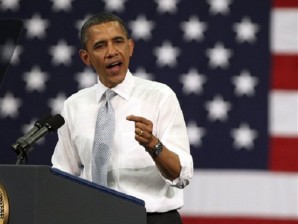
In this April 10, 2012 file photo, President Barack Obama speaks at Florida Atlantic University in Boca Raton, Fla. In the presidential battleground offering the biggest prize, Democrat Barack Obama is focused on ratcheting up voter turnout in Florida’s university towns, Hispanic enclaves like the Puerto Rican-dominated Orlando region and South Florida’s Jewish communities. Republican challenger Mitt Romney, in turn, is working to squeeze as many votes as possible out of north Florida’s conservative military bastions, the senior-heavy Gulf Coast and Miami’s Cuban community. (AP/Lynne Sladky)
WASHINGTON— The campaigns of President Barack Obama and Republican challenger Mitt Romney have gained a Spanish accent with Hispanics projected to be nearly a third of the U.S. population by 2050 and already making up a crucial voting bloc in battleground states from Florida to Nevada.
Romney’s son Craig, for example, has become his father’s personal interpreter, explaining in skillful Spanish in targeted TV ads that his dad is a man “con grandes convicciones,” or “with strong beliefs.” He will fight “para encaminar nuestro pais y crear empleos,” or “to guide our country and create jobs,” Craig Romney says.
The Obama campaign has recycled its 2008 campaign slogan, “Si, se puede,” or “Yes, we can,” for this year’s run. The catchphrase has special meaning as the motto of the late Cesar Chavez and the United Farmworker’s Union and has become a ubiquitous staple of the president’s attempts to identify with and retain the Latino support he received the last time he ran.
After English, Spanish is the country’s most-used language. Nearly 37 million U.S. residents speak Spanish at home, about 12 percent, according the U.S. Census Bureau. First- and second-generation Latinos might be less likely to speak Spanish daily, but this is countered by newly arrived Spanish-speaking immigrants.
But language alone won’t do it, say some Latino advocates.
Clarissa Martinez de Castro, director of civic engagement and immigration for the National Council of La Raza, the country’s largest Latino civil rights organization, said that beyond publishing ads in Spanish, both campaigns need to tailor their outreach to respond to the challenges of engaging Latinos politically.
Latinos are more likely to be new voters. Overall, the median age for Latinos is 27.6 years, compared with 42 years for non-Hispanic whites. An estimated 50,000 Hispanics turn 18 each month and become eligible to vote.
A want of experience means Latinos are more likely to lack the information they need to understand and navigate the voting system, she said. This leads to low voter registration and turnout.
And not all Latinos are immigrants, she noted, so the assumption that immigration is the top issue for them may be wrong. Job creation and the economy are high on the list for most Latino voters, she said, just as they are for the rest of the country.
“We’re not that different from other electorates,” De Castro said. “Spanish language is important, but if that’s the extent of (the campaigns’) Latino outreach, then they are missing part of the picture.”
Both campaigns accuse each other of using Spanish as a superficial vote-getting tool while lacking a real commitment to Latino voters.
Alfonso Aguilar, executive director of the Latino Partnership for Conservative Principles, said that while the Obama administration may have done a better job advertising in Spanish, the president has failed to implement policies he promised during his 2008 campaign.
“Latinos are going to appreciate being spoken to in Spanish if the promises that are made to them are sincere and gain substance once the candidate gets to office,” said Aguilar, who served as Republican President George W. Bush’s chief of the U.S. Office of Citizenship.
Jaime Areizaga, deputy director for Hispanic affairs for the Democratic National Committee, countered that the appointment of Latinos to key positions shows the party’s commitment to Latinos.
The Democratic Party has “put our money where our mouth is” by launching an advertising campaign that promotes a consistent message across languages and engages with Latinos on a local level, Areizaga said.
In accented Spanish, Jackie Kennedy in 1960 made one of the first TV ads in Spanish encouraging Americans to vote for her husband, John F. Kennedy, “un lider capaz de guiar nuestros destinos,” she said — “a leader capable of guiding our destinies.”